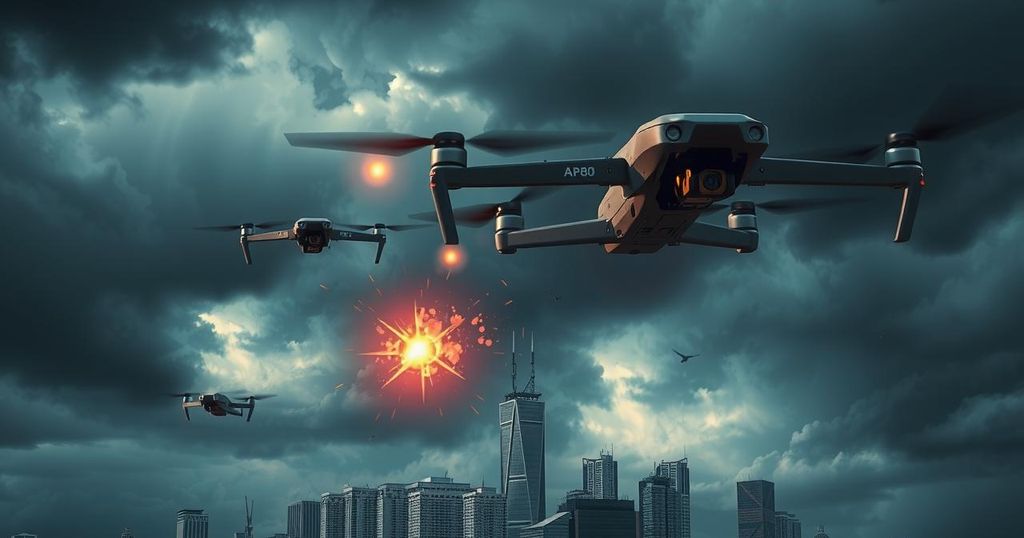Drone Attacks Elevate Tensions in Sudan’s Civil War
The Rapid Support Forces have escalated their operations in Sudan by launching unprecedented drone strikes on Port Sudan. This shift comes as the RSF adapts to military losses, targeting critical infrastructure and raising international concerns about the worsening humanitarian crisis. Both sides are accused of war crimes, with foreign powers seemingly influencing the conflict, suggesting an urgent need for diplomatic intervention.
In a significant escalation in Sudan’s ongoing civil conflict, paramilitary fighters known as the Rapid Support Forces (RSF) have launched a series of drone strikes on Port Sudan. This marks a new phase in the war as the RSF has been pushed out of the capital, Khartoum. The recent assaults have not only disrupted life in the city, leading to power blackouts and water shortages, but they also exemplify an advanced approach to warfare using drones. Alan Boswell of the International Crisis Group calls this tactical shift a potential “shock and awe campaign.”
For months, the RSF has targeted vital civilian infrastructure such as dams and power stations, especially in army-dominated regions. However, the attacks in Port Sudan indicate a change in their strategy, presenting a potent reminder of their continued military capabilities. Despite significant losses of territory, the RSF’s actions suggest a determination to escalate their operations and maintain a narrative against the Sudanese Armed Forces (SAF). Kholood Khair, a Sudanese political analyst, remarked that the RSF aims to demonstrate its influence, declaring that while the SAF may control Khartoum, governing it remains a complex challenge.
The RSF has yet to directly comment on their drone operations, instead continuing to accuse the SAF of committing war crimes against civilians while claiming external support from Iran. Both sides face accusations of human rights abuses, yet reports specifically target the RSF regarding grave allegations such as mass rape and genocide. Drone warfare’s advancement—through tech improvements—contributes to the complexity of this conflict, as both forces evolve their tactics for combat.
Recent analyses suggest that the RSF has acquired sophisticated drones from foreign supporters, potentially altering air combat dynamics. For instance, recent drone strikes reportedly utilized a series of 11 Kamikaze drones, diverting attention from a key strike that successfully hit a military airbase. Jeremy Binnie from Jane’s revealed that remnants of these drones appear to represent improved models, possibly better equipped to evade air defenses. Meanwhile, allegations surface claiming foreign powers, notably the United Arab Emirates, are supplying these drones to the RSF, adding yet another layer of external engagement in Sudan’s strife.
The recent attacks and the international response underscore the heightened stakes in this conflict. The UN has alerted to the humanitarian implications these drone strikes pose, as Port Sudan serves as a critical point for aid and support. This situation not only complicates relief efforts but also indicates a significant redefinition of warfare dynamics in Sudan. The escalating violence and its resulting fatalities prompt concern across the region.
Experts have drawn parallels between the ongoing drone conflict in Sudan to that seen in the Russia-Ukraine war, where drone warfare has become pivotal. As analysts such as Justin Lynch note, the implications of this warfare style hint at an evolving conflict landscape, fundamentally shifting expectations of non-state actors and their capabilities. The Sudanese government has expressed fears regarding the regional stability due to these drone strikes, signifying the international stakes at play as well.
Without diplomatic agreements, the continuation of this conflict appears likely, as both sides remain embedded in a cycle of violence. The RSF’s recent actions have restructured the strategic dialogues around foreign influence, military capability, and civil casualties in Sudan, leading experts to call for urgent international intervention and support to avert further escalation.
The RSF’s drone strikes on Port Sudan transform the landscape of Sudan’s civil war, showcasing a dramatic shift in military tactics and a growing reliance on advanced technologies. With both parties accused of war crimes and external forces implicated in the ongoing violence, these developments heighten the humanitarian crisis in the region. The recent escalation raises urgent questions about governance, foreign involvement, and the future trajectory of this protracted conflict.
Original Source: www.bbc.com




Post Comment